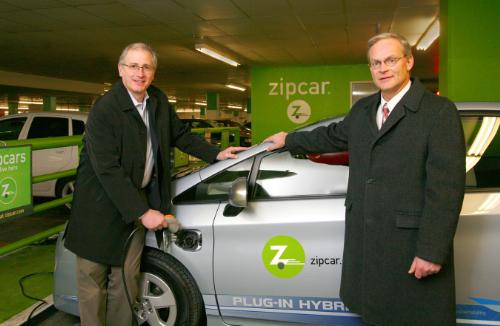Oh, those wacky Germans and their car-sharing schemes.
BMW said yesterday that it would launch a pilot car-sharing program, first in Munich and then in Berlin, starting next month. The cooperative venture with Sixt AG will be called DriveNow.
BMW says DriveNow will be the "first-ever car-sharing scheme offering premium models," in this case its BMW 1-Series and Mini Cooper vehicles.
The company also expects to introduce plug-in and battery electric vehicles, presumbly its i3 minicar, later on. All cars will have four or more seats, and luxury features like heated seats and automated parking assist.
Global ambitions
BMW specifically said it plans to roll out DriveNow to other European countries and eventually on other continents--for which read, North America--with a planned base of 1 million registered users by 2020.

Zipcar's Scott Griffith and Toyota's Frank Miller with a Toyota Prius PHV
Unlike car rental services, which are mostly used by travellers, car-sharing services can replace one or more vehicles in their users' households by making available nearby vehicles of a variety of types.
The leading service, ZipCar, offers more than a dozen different makes and models for its members to choose from, depending on their specific needs.
No staff needed
Registered ZipCar users reserve their car by the hour ahead of time via web or smart phone. ZipCar sends them a smart card that unlocks the car, and all billing is automatic, meaning no onsite staff are needed.
Company staff take care of maintenance, filling the car with gasoline, and if necessary, moving the cars to different locations. They may be in designated parking places, garages, or other locations around city centers and urban neighborhoods.
Manufacturer-specific car-sharing programs like BMW's provide an alternative to ZipCar and various local services, but may be limited in the range of vehicles and types they offer. ZipCar, for instance, includes many different hybrid and subcompact models.
Smart came first
BMW follows in the footsteps of Smart, the minicar maker owned by Mercedes-Benz. Smart's Car2Go car-sharing service was tested in Ulm, Germany, late in 2008 and officially launched there in early 2009, with plans for other cities to follow.

Car2Go Smart ForTwo in Austin, Texas
Smart also piloted its Car2Go service in Austin, Texas, where city employees and enrolled users can rent its ForTwo minicars by the hour.
That program has been running for 18 months now, and its brightly labeled Smarts can be seen all over downtown Austin.
Peer-to-peer sharing?
But even more intriguing in the world of car-sharing is the prospect of private individuals letting others rent their cars--known as peer-to-peer car sharing--for short periods when they're not otherwise being used.
Enabled by smart phone apps like RelayRides or GetAround (launched at CES this year), these services are now being tested in cities including Boston and San Francisco.
[BMW]
+++++++++++













